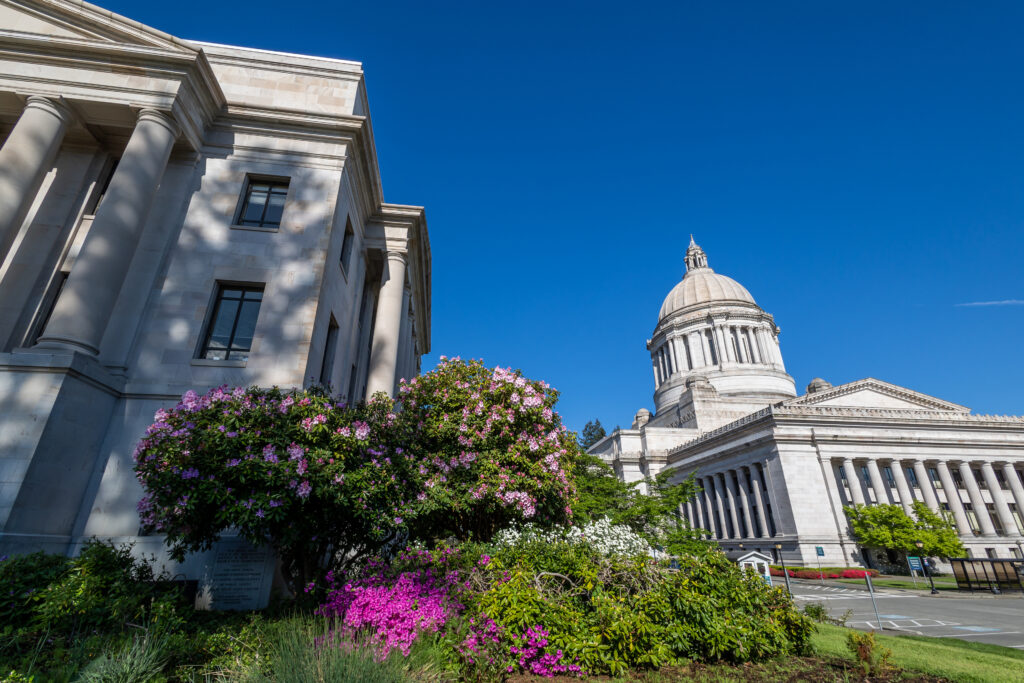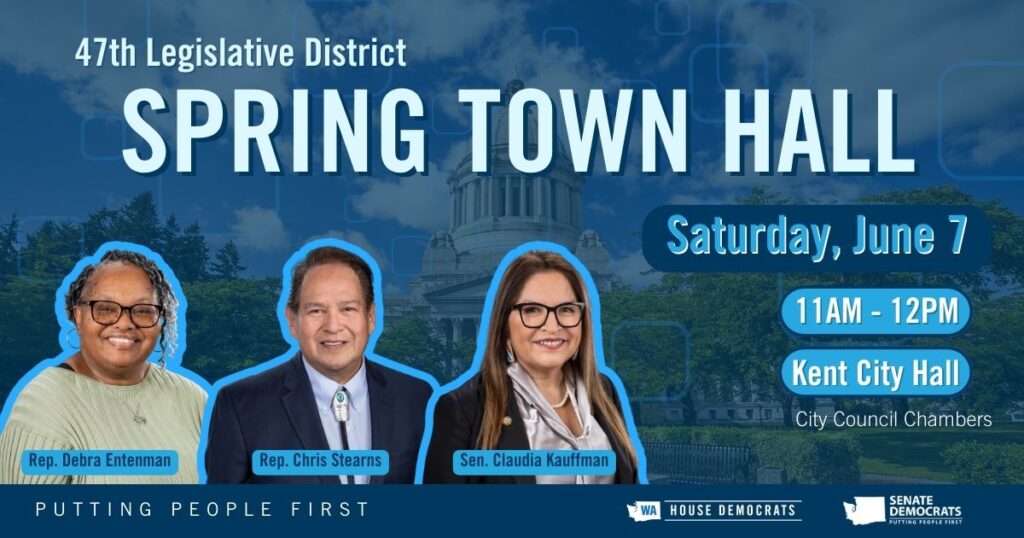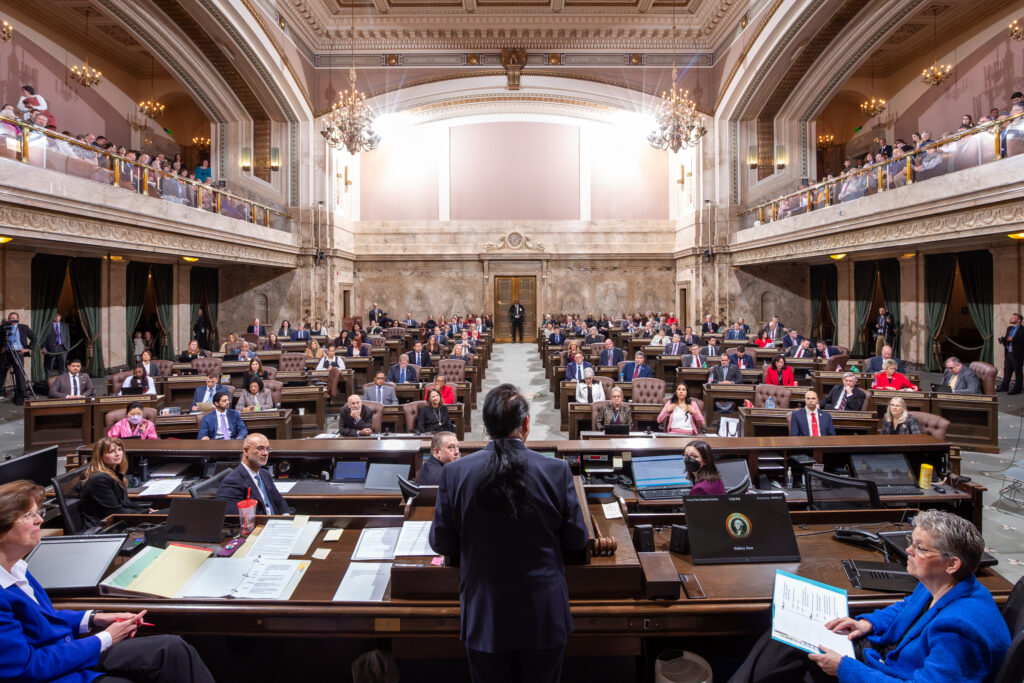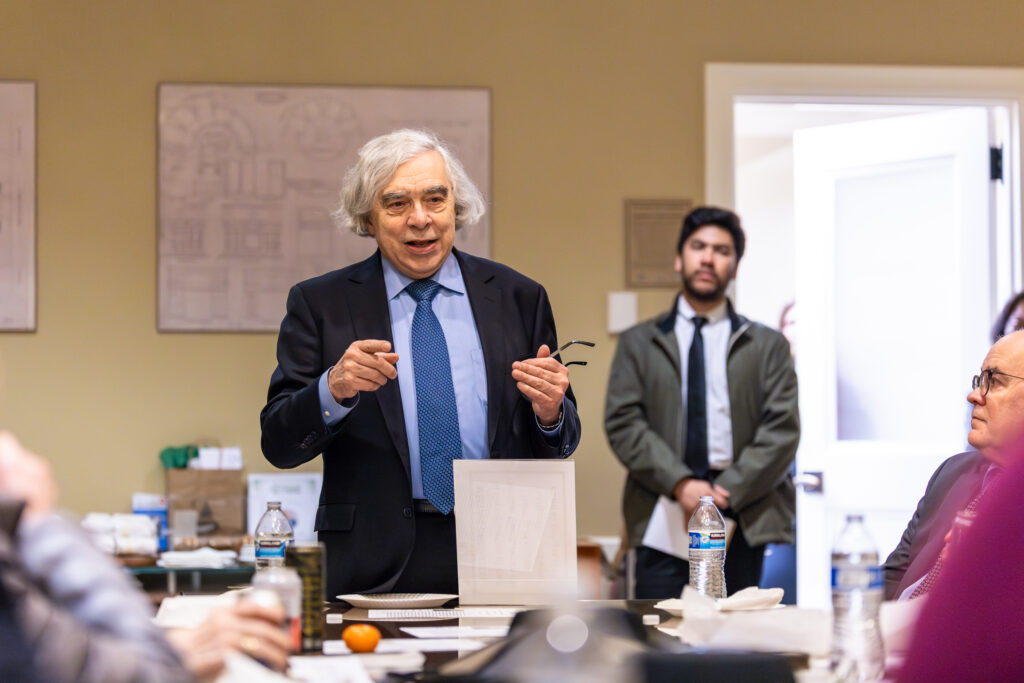
Washington State Capitol and John A. Cherberg Building.
Dear friends and neighbors,
On April 27 the legislature adjourned after a grueling 105-day session. We entered session with the promise of federal chaos and the knowledge that we had significant budget shortfall to navigate. While facing these challenges, we also had to cope with the sadness of the loss of former Speaker of the House Frank Chopp and Senator Bill Ramos.
But we did it. Despite the hard days, late nights, and long hours, we emerged with a balanced 2025-27 biennial budget that prioritizes education, housing, and healthcare for every Washingtonian from the youngest neighbors to the oldest.
Join your 47th LD Legislators for a Town Hall this Weekend!

Rep. Debra Entenman and Sen. Claudia Kauffman and I are hosting an in-person town hall this weekend! I hope you’ll join us on June 7 from 11AM – 12PM at Kent City Hall in the Kent Council Chambers. Bring your questions, complaints, and your neighbors!
A Final Bill Update
Two of the bills I introduced this session made it to the governor’s desk and were signed into law. They were:
☢️ HB 1461 — Joint operating agencies: Simplifies the project approval process for Washington’s public power agencies under a certain dollar amount to make it easier and more cost-effective to maintain and modernize infrastructure, including nuclear fission and fusion.
🎲 HB 1222 — Protecting sensitive information in the gambling industry: Sheilds sensitive financial and security information from falling into the wrong hands and potentially harming businesses and consumers.
A Few Other bills passed by the 47th LD Delegation:
🚓HB 2015 — Public Safety Funding Act (Rep. Debra Entenman): Allows local law enforcement agencies to access grants for hiring, training & mental health support, and allows communities to adopt a small sales tax to boost public safety & crisis response programs. This bill will help keep our neighborhoods safe and support the folks who serve our communities.
🎓 SB 5110 — Tribal Elder Education (Sen. Claudia Kauffman): Invests in Washington’s tribal communities by allowing community and technical colleges waive tuition and fees for tribal elders over 55 from eligible tribes.
Mental & Behavioral Health Support on Vashon
The need for more inpatient bed capacity in King County and across the state in general is no secret, but building new facilities doesn’t happen overnight. In the case of the highly anticipated Thunderbird Treatment Center, the road to construction has faced many roadblocks, but just a few weeks ago the final permit was approved, and the next phase can begin!
When the facility is finished it will add 92 beds to King County — increasing capacity by more than 62%, to help Washington’s Indigenous residents find treatment for addiction. Our Native communities have been hardest hit by the fentanyl crisis, and providing culture-based health care has been proven to be more effective.
You can read more about it in this article from the Vashon-Maury Island Beachcomber.
Budget Basics
Before leaving office, former Governor Jay Inslee proposed an all-cuts budget with no new revenue to show exactly how harmful it would be. Adopting that budget would have been devastating for people across the state, from newborns to students to seniors. It would have left parents without childcare, taken food off the table for working families, and slashed funding for mental health and addiction treatment.
You sent me to Olympia to strengthen our communities and help make Washington a better place to live. That’s why I voted yes on a final budget that balances responsible cuts with new revenue. It allows us to honor past commitments, ensure our kids have safe and supportive schools, and invest in the programs and infrastructure that keep Washington moving forward.
The state has three budgets: operating, which pays for day-to-day costs; transportation; and the capital budget, overseeing construction projects. Here’s a little bit about regional and local investments made in the capital and transportation budgets.
Here are top-level highlights of the $7.5 billion, two-year capital budget, which passed with overwhelming bipartisan support:
🏠 Affordable Housing
The new two-year budget invests a historic total of $782 million in housing and homelessness programs. This includes a record-setting $605 million for the Housing Trust Fund, directly funding the construction of affordable housing. I was proud to champion $50M to specifically focus on expanding housing for families with individuals who have developmental disabilities. Most of these families are on fixed incomes with very limited resources.
🍎 K-12 and Early Learning
There is nearly $1 billion for K-12 school construction and early learning facilities. That total includes $202 million for small district and tribal compact schools, $151 million for school seismic safety, and $100 million for early learning facilities. The legislature also increased funding for special education and the Local Efforts Assistance fund totaling $200M million. It also increases funds for materials, supplies and operating costs ($215 million), and maintains funding for school meals and summer EBT for kids ($45 million).
🧠 Behavioral Health
The budget includes $130 million in grants for projects expanding behavioral health care capacity in community settings, increased funding for 988 & Crisis Facility Grants for three centers, and funds the completion of the new forensic hospital facility at Western State Hospital.
For more details about the capital budget—or the state operating budget and transportation budget–visit fiscal.wa.gov.
There’s over $12 million in projects right here in the 47th district:
- $2M for IACS Kent Community Center
- $500K for Auburn Ave Theater Rebuild
- $500K for Jenkins Creek Recreational Trail
- $155K for Meridian Grange
- $7.72M for Soos Creek Hatchery Renovation
- $1.94M for Jenkins Creek Trail Phase 1
Transportation Budget
The new transportation budget includes $15.6 billion in projects and improvements to the state’s network of highways, ferries, trains, buses, and other alternatives so that people and freight can move around Washington efficiently and safely.
The budget includes more than $14.5 million in local investments, and more for regional improvements.
Local:
- $9M – Meet Me on Meeker Multimodal Improvements
- $5.49M – King County Metro RapidRide I Line (Auburn segment)
- $100K – State Route 516 Pedestrian Bridge
Regional:
- $324K City of Kent: Rapid Ride Facility Passenger Amenities & Access Improv
- $5.12M – King County Metro – RapidRide I Line – Renton Speed & Reliability Improv
- $416K – City of Tukwila – Tukwila and South King County TDM
- $311K – City of Bellevue Transportation Demand Management Program
- $3.13M – King County Metro – Burien Transit Ctr Layover Charging Infrastructure
- $7.82M – King County Metro – 40ft Transit Battery Electric Bus Purchase
- $7.35M – 224th Corridor Completion
- $15M – SR 18 Widening – Issaquah/Hobart Rd to Raging River – Phase I
Session Highlights
Serving as Speaker Pro Tempore

Just being in the Capitol building in Olympia is awe-inspiring. The smooth marble amplifying every footstep, intricate and ornate cornices, and heavy drapes drawn aside for lawmakers to walk onto the House floor all have an air of grandeur. This year I had the honor of viewing the floor from a different — and slightly more intimidating —angle: serving as Speaker Pro Tem from podium on the dais.
The Speaker gavels the members of the House in and out of session, administers routine parliamentary procedures, and presides during floor debate to ensure decorum is maintained. It was exhilarating, exciting, and exhausting to preside over the floor for the first time this session, and it made me listen more intently to the debate offered from both sides of the aisle.
If you want to hear more about my first session as Speaker Pro Tempore (including the time I dropped the gavel) take a listen to my Capitol Ideas podcast episode.
Nuclear Caucus Welcoming Former U.S. Secretary of Energy Ernest Moniz

Toward the end of session, Rep. Stephanie Barnard and I had the honor of welcoming former U.S. Secretary of Energy Ernest Moniz to one of our Nuclear Energy Caucus meetings. I thoroughly enjoyed every minute of it and appreciated his industry insight and willingness to share his deep knowledge around nuclear energy generation, including suggestions and guidance for future energy use planning.
Aside from a shared interest in sustainable and efficient energy that will meet Washington’s power needs well into the future, Secretary Moniz and I both served in the U.S. Department of Energy early in our careers under then-Secretary Bill Richardson.
In 1977 President Jimmy Carter established the Department of Energy and with that, the United States Secretary of Energy position was created to manage energy production and regulation, later with a growing emphasis on developing technologically efficient energy sources. In 1998 my mentor and boss, Congressman Bill Richardson became the 9th Secretary of Energy under President Clinton, and I was appointed director of Indian affairs for the Department of Energy. One of the coolest projects our department worked on during that time was the largest return of federal lands to a Native American tribe in more than 100 years, as well as establishing the Tribal Energy Program.
Working with Bill showed me how collaboration between sovereign tribes and the federal government could bring healthcare, revenue, and better services to tribal nations, and it’s a lesson I’ve brought with me as State Representative.
Interim Plans
Between the end of one session and the beginning of the next is the period we call “interim,” when lawmakers return to their districts to meet with constituents, explore issues facing our communities, and dive deeper into specific topics where legislation might be needed to solve a problem—all while many of us also return to our regular jobs.
This interim I’ll be attending community events to speak with folks from across the district about ways we can address our region’s specific needs and problems.
Thank you for the honor of serving you as State Representative.
-Chris
